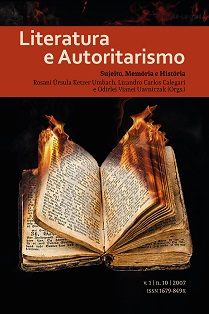Corpus: the political life
DOI:
https://doi.org/10.5902/1679849X73952Keywords:
Marginal literature, Body, PoliticsAbstract
Ferréz’s latest book, Ninguém é inocente em São Paulo (Nobody is Innocent in São Paulo), resumes the discussion about guilt and innocence, which allows us to remit to Giorgio Agamben’s reading of Primo Levis’ gray zone in Remnants of Auschwitz. The Italian philosopher refers to this gray zone as a zone of irresponsibility, where there is no distinction between victims and hangmen: the oppressor becomes oppressed and the oppressed becomes oppressor. This zone of indistinction doesn’t allow the difference between exception and rule to appear; it is the exact space of the permanent state of exception in which we live. Not by chance we find in Ferréz’s book a short story called “Terminal (Nazista)”, in which we can’t figure if it’s about a bus station or a Nazi death camp: “I tried to look directly to the eyes, those who didn’t have their heads down, didn’t have ocular globes”. What remains to us, then, is to search for an ethical and, therefore, political path to defeat the constant attempt to naturalize the inhuman, the horror and the catastrophe. Agamben indicates, as a way out, the profanation and Jean-Luc Nancy insists on the thesis of the contact: both forms put the body at the core of political affairs. A politics that must not be founded by the politicization of bare life, which keeps the relation of sovereignty, that is, permits the capture and abandonment, the inclusion-exclusion, but, on the contrary, a politics founded in the political potency contained in the center of bare life, because this life is politics itself and has as objective the search of happiness.
Downloads
References
AGAMBEN, Giorgio. A comunidade que vem. Trad. António Guerreiro. Lisboa: Editorial Presença, 1993.
AGAMBEN, Giorgio. Homo Sacer: O poder soberano e a vida nua. Trad. Henrique Burigo. Belo Horizonte: UFMG, 2002.
AGAMBEN, Giorgio. Quel che resta di Auschwitz: l’archivio e il testemone. Torino: Bollati Boringhieri, 2005.
AGAMBEN, Giorgio. Profanaciones. Trad. Flavia Costa y Edgardo Costa. Adriana Hidalgo: Buenos Aires, 2005a.
AGAMBEN, Giorgio. Il regno e la gloria: per una genealogia teologica dell’economia e del governo. (Homo sacer Vol. II, t. 2). Vicenza: Neri Pozza, 2007.
BADIOU, Alain. El siglo. Trad. Horacio Pons. Buenos Aires: Manantial, 2005.
BENJAMIN, Walter. Teses sobre o conceito da história. Trad. Jeanne Marie Gagnebin . Mimeografado, 2003.
BLANCHOT, Maurice. La escritura del desastre. Trad. Pierre de Place. Caracas: Monte Ávila, 1983.
DELEUZE, Gilles. Abecedário de Gilles Deleuze. “O abecedário de Gilles Deleuze”. Entrevista com Claire Parnet. In: Dossiê Gilles Deleuze. Disponível em http://br.geocities.com/polis_contemp/deleuze_abc.html. Acesso em 03/08/2006.
DELEUZE, Gilles. Post Scriptum sobre a sociedade do controle. In: Conversações: 1972-1990. Trad. Peter Pal Pelbart. Rio de Janeiro: Ed. 34, 1992.
FERRÉZ. Ninguém é inocente em São Paulo. Rio de Janeiro: Objetiva, 2006.
FERRÉZ. Entrevista concedida a Pedro Alexandre Sanches em 22/08/2006. Disponível em: http://pedroalexandresanches.blogspot.com/2006/09/ferrz-manual-prtico-dos-afetos.html. (2006b).
DVD 100% Favela. Grupo Negredo (Orgs). 2006c. FERRÉZ. Capão Pecado. Rio de Janeiro: Objetiva, 2005.
FERRÉZ. www.ferrez.blogspot.com
FOUCAULT, M. Em defesa da sociedade. Trad. Maria E. Galvão. São Paulo: Martins Fontes, 2002.
HALL, Stuart. Da diáspora identidades e mediações culturais. Belo Horizonte: Editora UFMG, 2003.
KEHL, Maria Rita. A Fratia Órfã: o esforço civilizatório do rap na periferia de São Paulo. ROCHA, João Cezar de Castro (Org). In: Nenhum Brasil Existe: pequena enciclopédia. Rio de Janeiro: UniverCidade e Topbooks, 2003.
LACAN, Jacques. Televisão. Trad. Atonio Quinet. Rio de Janeiro: Jorge Zahar, 1993.
NANCY, Jean-Luc. Corpus. Trad. Patrício Bulnes. Madrid: Arena Libros, 2003.
PELBART, Peter. O corpo informe. In: GREINER, Christine; AMORIN, Claudia (Orgs). Leituras do Corpo. São Paulo: Annablume, 2003.
RANCIÈRE, Jacques. Deleuze e a literatura. Trad. Ana Lucia Oliveira. In: Matraga, n.12, ago-dez 1999.
SCHOLLHAMMER, Karl Eric. As práticas de uma língua menor: reflexões sobre Deleuze e Guattari. In: Revista Ipotesi. v. 5,n.1. Juiz de Fora: UFJF, jul-dez 2001.
ZIZEK, Slavoj. Bem-vindo ao deserto do Real! : cinco ensaios sobre o 11 de setembro e datas relacionadas. Paulo Cezar Castanheira (trad.). São Paulo: Boitempo, 2003.
Downloads
Published
How to Cite
Issue
Section
License
DECLARAÇÃO DE ORIGINALIDADE E EXCLUSIVIDADE E CESSÃO DE DIREITOS AUTORAIS
Declaro que o presente artigo é original e não foi submetido à publicação em qualquer outro periódico nacional ou internacional, quer seja em parte ou na íntegra. Declaro, ainda, que após publicado pela Literatura e Autoritarismo, ele jamais será submetido a outro periódico. Também tenho ciência que a submissão dos originais à Literatura e Autoritarismo implica transferência dos direitos autorais da publicação digital. A não observância desse compromisso submeterá o infrator a sanções e penas previstas na Lei de Proteção de Direitos Autorais (nº 9610, de 19/02/98).






